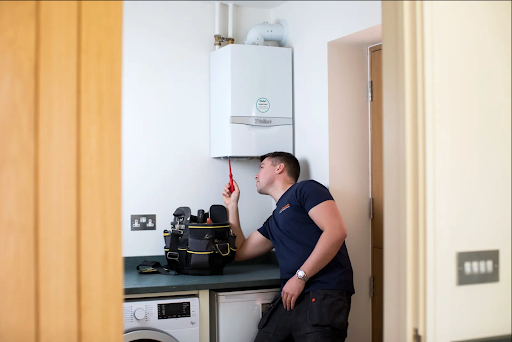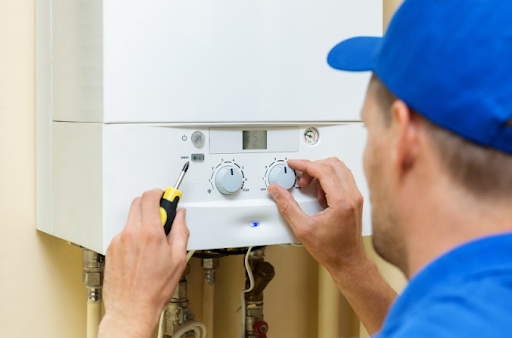If your heating system isn’t working as expected, it can be both frustrating and uncomfortable. Whether you’re a building manager or a homeowner, understanding the common causes of central heating issues and knowing what to do can save you time, money and prevent unnecessary service calls.
From checking the thermostat to inspecting the boiler pressure, there are several steps you can take to troubleshoot central heating problems before reaching out for professional help. In this guide, we’ll cover key steps to identify and resolve issues, ensuring your heating system runs smoothly and efficiently.
Common Reasons Why Your Central Heating Isn’t Working
There are several common reasons why your central heating isn’t working and addressing these before calling a professional can save you time and money. Here are the main reasons your central heating might not be working:
- Lack of Fuel or Energy Supply: If your boiler isn’t receiving the proper fuel source – be it gas, electricity or oil – your heating system won’t function. This could be due to power cuts, fuel shortages or issues with the energy supplier.
- Boiler Malfunction: A fault in your boiler, such as a malfunctioning pump, broken valve or a failed heat exchanger, can stop hot water from circulating properly, leading to a central heating breakdown.
- Blocked or Leaking Pipes: Debris or mineral build-up can cause blockages in the pipes, obstructing water flow and resulting in inefficient heating. Leaking pipes can also reduce system pressure, causing heating failure.
- Defective Thermostat or Controls: Faulty thermostats or heating controls can prevent communication with your boiler, meaning your central heating won’t activate or maintain the right temperature.
- System Imbalance: An unbalanced system, where some radiators are warm and others are cold, is often caused by incorrect valve settings or issues with the pump. This imbalance can lead to poor heating performance or a central heating breakdown.
By recognising these common heating issues, facilities managers, building owners and homeowners can troubleshoot their central heating systems more effectively.
10-Step Guide to Address Why Your Central Heating Isn’t Working
If your central heating isn’t working as it should, there are several simple troubleshooting steps you can take:
1. Check your Thermostat and Settings
Ensure your thermostat is set to the desired temperature. If it’s incorrectly set or malfunctioning, it could prevent the heating system from working. If it’s digital, check the display for any error codes or low battery signs. If you suspect a problem, reset or replace the batteries. A simple thermostat check can often resolve issues with your heating when it’s not working, and is a good first step in central heating troubleshooting.
2. Check for Low Boiler Pressure
Check the pressure gauge on your boiler. If it’s below 1 bar, top it up using the filling loop to restore the correct pressure. Make sure to do this slowly, as over-pressurising can cause damage. Keeping the boiler pressure in the optimal range ensures proper water circulation and prevents heating problems.
3. Inspect Your Radiators for Airlocks
If some radiators aren’t heating up, it may be due to airlocks in the system. To solve this, bleed your radiators using a radiator key to release any trapped air. This will restore the correct flow of hot water through the system and improve heating efficiency. Regularly bleeding your radiators is essential to maintaining a fully functioning heating system and preventing cold spots.
4. Examine the Pilot Light or Ignition
If you have an older boiler with a pilot light, check to see if it’s lit. If it’s out, follow the manufacturer’s instructions to safely relight it. For modern systems with electronic ignition, ensure the ignition system is functioning correctly. A faulty ignition or extinguished pilot light can prevent your heating from working, so it’s essential to address this before further troubleshooting.
5. Assess the Boiler and Pump for Faults
Listen for unusual noises such as banging or gurgling, as these can indicate problems with the pump or internal components. A malfunctioning pump may prevent hot water from circulating properly, affecting heating performance. If you notice any noises or the system isn’t working, check the pump and boiler for faults. If necessary, contact a professional to inspect and repair the system.
6. Check the Diverter Valve
If you have a combi boiler, the diverter valve directs hot water to your radiators. If the valve is stuck or faulty, it can prevent your heating from working properly. To check this, ensure the valve is correctly set for heating. If it’s malfunctioning, it may need repair or replacement to restore heating functionality to your system.
7. Examine the Fuse or Circuit Breaker
If your heating isn’t working, check the fuse or circuit breaker for the heating system. A tripped circuit breaker or blown fuse will prevent the system from receiving power. Reset the circuit breaker or replace the fuse as necessary. If power continues to be an issue, you may need to consult an electrician to ensure the electrical system is functioning properly.
8. Look for Blockages in the System
Sludge, debris or mineral build-ups can clog your heating system, reducing efficiency. If you suspect a blockage, consider having a power flush performed to remove debris and improve circulation. Regular maintenance and flushing of the system help ensure smooth water flow, preventing cold spots and keeping the system in top working condition.
9. Ensure Proper Insulation
Poor insulation around pipes, radiators or the boiler itself can lead to heat loss, making your system less effective. Ensure that pipes and radiators are properly insulated to prevent heat from escaping. Check the surrounding areas for draughts or gaps that could cause heat to leak out. Good insulation maximises your heating system’s efficiency, preventing energy loss and reducing heating costs.
10. Check the Fuel Supply
If your heating system runs on gas, oil or electricity, ensure the fuel supply is intact. For gas boilers, ensure the gas valve is open, and check for any interruptions in the gas supply. For electric systems, confirm that the power supply is steady. A disruption in the fuel supply is a common reason for heating not working, so ensuring continuity is key to keeping your system running smoothly.
By following these 10 steps, you can take action to resolve common issues with your central heating system, potentially avoiding the need for a professional visit. If the issue persists after checking these steps, it may be time to call in a heating expert.
When to Call a Professional for Heating Repairs
If your heating system isn’t working despite troubleshooting, it’s time to call for professional help. Here are 5 key signs that you need expert assistance:
- Persistent Boiler Issues: If the boiler fails to turn on or repeatedly shuts down, it could indicate an internal fault that needs a professional’s attention.
- Low Boiler Pressure: If topping up your boiler pressure doesn’t fix the issue, it could point to an underlying fault, such as a leak or malfunctioning component.
- Unusual Noises: Strange sounds like banging, gurgling or whistling could indicate air in the system, a blocked pump or another issue that requires a qualified engineer.
- Leaking Water: Any water leakage from the boiler or radiators suggests a potential fault that should be addressed by a professional to prevent further damage.
- Error Codes or Warning Lights: If your boiler displays error codes or warning lights, it’s important to call a professional for diagnosis and repair.
Ensuring Your Heating System Runs Smoothly
By following the troubleshooting steps in this blog, building managers and homeowners alike can often resolve issues quickly and efficiently. Addressing common problems like low boiler pressure, airlocks and system imbalances as soon as they arise will help to maintain optimal heating performance.
Regular maintenance is key to preventing heating breakdowns and ensuring the longevity of your system. However, if the problem persists or seems more complex, it’s important to call in a professional. A qualified engineer can ensure your heating system is fully functional and safe, keeping your property warm and energy-efficient.
| If you’re experiencing any of these issues, don’t wait – contact a heating professional to avoid further complications and ensure your system runs safely and efficiently.
Contact us today: call 01243 784711 or email info@painemanwaring.co.uk |
FAQs
Why is my central heating not working even though the thermostat is set correctly?
If your thermostat is set correctly but your heating isn’t working, it could be due to low boiler pressure, airlocks in the radiators or a malfunctioning valve. Check the boiler pressure and ensure that the radiators are bled of any trapped air. If the issue persists, a professional may be needed to examine the system.
How often should I have my central heating system serviced?
It’s recommended to have your central heating system serviced at least once a year. Regular maintenance ensures that all components are functioning efficiently, helps identify any potential issues early and can extend the lifespan of your boiler and heating system.
What should I do if my boiler pressure keeps dropping?
If your boiler pressure keeps dropping, it could indicate a leak in the system, or an issue with the valve or pump. Check for any visible leaks around the boiler and radiators. If you cannot find a leak or if topping up the pressure doesn’t resolve the issue, call a professional heating engineer to investigate further.
Paine Manwaring is an established, professional and highly experienced supplier of plumbing, heating and electrical services to domestic and commercial customers throughout Sussex, Surrey and Hampshire.
For more information about our heating, plumbing and electrical services which we provide for both homes and businesses, get in touch with a member of our expert and friendly team today on 01903 237522 or enquiries@painemanwaring.co.uk (Worthing) or 01243 784711 or info@painemanwaring.co.uk (Chichester).




